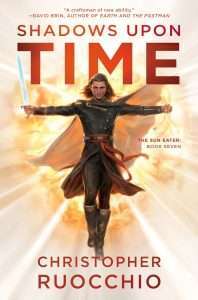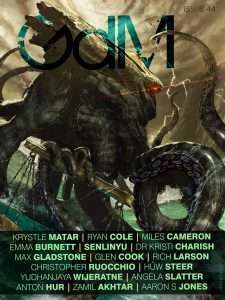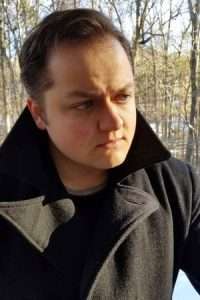INTERVIEW: with author Christopher Ruocchio
Christopher Ruocchio—author of The Sun Eater series—sat with our team to discuss writing, catharsis, distinguishing sub-genres, video games, and, of course, Shadows Upon Time, the seventh and final novel of The Sun Eater series.
 [GdM] Hey Christopher, thanks so much for doing this interview! While I’m already aware that you and the books are fantastic, can you do me a favor and give them a quick pitch for the readers of this interview?
[GdM] Hey Christopher, thanks so much for doing this interview! While I’m already aware that you and the books are fantastic, can you do me a favor and give them a quick pitch for the readers of this interview?
[CR] Certainly, and thanks for having me. The Sun Eater is a space opera—I like to say science fantasy adventure—set some 20,000 years in our future, in a time when mankind has settled about a third of the galaxy. It is the story of a man named Hadrian Marlowe, a nobleman who runs away from his home in this great galactic empire and finds himself caught in the now centuries-long struggle between mankind and a race of alien marauders called the Cielcin. The series is written as a memoir, and Hadrian starts out by telling us that he is the man who ended the war and all-but-annihilated the Cielcin, and that he did so by destroying a star. I used to say the series is “like Star Wars, if you can imagine becoming Darth Vader was Anakin’s best available option.” The series owes a great deal to Dune as well, but it’s more Lynch than Herbert.
[GdM] So, Shadows Upon Time, the seventh and final novel in the Sun Eater series is coming out this November. The hype around its release is insane so let’s start with the obvious question: how do you feel about all of it?
[CR] This is perhaps not an inspiring answer, but I feel a bit aggrieved. I have worked on the series in some form or other since I was 8-years-old. I started trying to write a book in second grade, and I haven’t really stopped trying to finish that story until really a couple weeks ago, when I turned in the final page proofs. Now, Sun Eater in no way resembles what I started working on as a child, but the work itself never stopped. It’s weird to be done, and weirder to be starting the next project. Hadrian has been with me nearly my entire life. It is very strange to be done with him. I still don’t know how to feel.
That being said, I am extremely pleased with Shadows. The dozen or so people who have read it so far have loved it, and I am very encouraged by that response. I say often that I cannot really even see my work the way you all do, and so I can’t really see what the book is until I see what you all see in it. November will be a very exciting time for me.
[GdM] During the writing of Shadows Upon Time, were there any moments that brought you close to tears?
[CR] Yes. Toward the very end. There were a couple final scenes that almost—almost—got me. I don’t really connect emotionally with the content of the story, but as I say, I have grieved for the passing of the story as a whole. That being said, there was one finale that did get me.
 [GdM] From page one of Empire of Silence, everything has already happened and Hadrian is telling his life story. With the completion of Shadows Upon Time, were there any unplanned twists that came about as you wrote, or was it all pretty much outlined and completed as you’d expected?
[GdM] From page one of Empire of Silence, everything has already happened and Hadrian is telling his life story. With the completion of Shadows Upon Time, were there any unplanned twists that came about as you wrote, or was it all pretty much outlined and completed as you’d expected?
[CR] There is an entire character in book 7 that was not part of any plan at all, but who appeared very early in the book and sort of grew to take up more space than I expected. Otherwise, Shadows was really the book I wanted to write. This is the book that really was the idea, and the rest of the series was the result of my working backward from the idea to be able to tell this story. We’ve always been heading toward this story. We just had to earn it.
[GdM] In your interview with The Broken Binding you talked about the importance of outlining and how you sometimes over-do it. Have you ever had a plot thread outlined and then it refused to cooperate when you went to write it?
[CR] No, not really. All I’ve ever had is insufficient outlining. I have had to go back many, many times and elaborate on sections of the outline or otherwise adjust them. The problem is never really bad planning, just insufficient planning. Maybe that’s the sort of thing you mean, but I think the distinction matters. For example, in Demon in White, I had to stop and redo the outline for the Battle of Berenike three or four times as I was muddling through and realized I was having issues with logistics. Nothing gives me a bigger headache than logistics. Making sure the characters are where they need to be when they need to be there and that everything makes sense is a nightmare for me, especially with the kinds of time scales involved. Character is easy. Worldbuilding is easy. Theme and meaning are easy. It’s just making them all work together that makes me grind my teeth to their foundations.
[GdM] Throughout the Sun Eater series we’ve seen a pretty wide variety of subgenres come about (sword and sandal, horror, political thriller, etc.). Was that something done intentionally?
[CR] Yes and no. I have very contrary opinions (well, about everything—but) about genre. I am not sure science fiction even is a genre, for starters. I think that technically, the genre for Sun Eater is memoir—albeit a fictional one. What we call genres in fantasy-and science fiction-land seem to me more like clustered tropes. (We call cyberpunk a genre, but is it not really more a question of aesthetics and worldbuilding choices? Is that a genre? I’m not so sure…) I admit this is eggheaded hairsplitting behavior, but then I am an egghead who likes to split hairs. In any case, I think of these things—whatever they are—things like sword and sandal, or horror, or thriller, more as colors on my palette than boxes to fit my story into. I do not and have never cared about BISACs and what tab my work should go under on Amazon. The algorithm can eat itself for all I care. I try to write my story like it is, like it needs to be, and let the marketing people decide what to do with it. But in writing, I will say something like “we can go a bit Gothic in this section, a bit more fantasy here.” There is, quite famously, an homage to anime beach arcs in Demon in White, for example. That kind of off-the-wall section is, I think, the result of thinking of these things more in terms of color than a label. I hope that makes sense. By not thinking in genre-as-box terms, I hope I’m freer to make the right decision for the story and the characters, rather than the right choice for the market or my readers’ expectations.
[GdM] What are you reading right now?
[CR] I am not, at the moment, reading anything. I was asked to jump right into my next project, and so I am outlining that and reading the odd piece on Wikipedia or JSTOR to support my scheming… but the truth is that it is very rare for me to read fiction for pleasure anymore. I don’t keep up with the industry at all. I don’t want to. Maybe that sounds bad—I don’t mean it to. But I worked for Baen Books for 7 years, and in that time all I did was read titles for work, and that kind of turned the reading of fiction into work, and it’s been hard for me to recover. I read a lot of nonfiction—mostly primary sources at the moment. Greek and Roman literature. (Is that a clue?) Most of my engagement with fiction is through other media. I watched Twin Peaks in its entirety earlier this year, and I am excited to play Hollow Knight Silksong in a couple days, as I write this.
[GdM] If you could go back in time to the day when the first draft of Empire of Silence was finished and give yourself one piece of advice, what would it be?
[CR] Empire of Silence is the only book that I wrote without an outline, and I think the structure suffers for that reason. I would go back in time with the outlines for the subsequent books (and show baby-me how it’s done). I am basically the Saint Paul of outlines. I cannot preach their goodness loudly or often enough. I cannot imagine writing without outlining first. I have no idea how I did it on Empire, and I sincerely hope I never try to write without an outline ever again.
 Author Christopher Ruocchio
Author Christopher Ruocchio[GdM] Most authors have a graveyard of incomplete manuscripts and false starts before they pen their first full novel. Is this true for you, and if so, what was the first book you ever tried to write?
[CR] Yes, that was true for me, too—although I have a slight advantage over other writers in that I started that process when I was eight years old, and so got most of my false starts and garbage out the way early. I did finish what is probably a novella in middle school—one which interestingly is best preserved in my Adaman sword-and-sorcery stories. That setting is sort of a very adult glow-up of that earlier concept. But at the time it was all part of the write-delete-write again churn that eventually spat out The Murdered Sun, which is the (much shorter) original version of Empire of Silence I sold to DAW in 2016. Empire of Silence is the result of extensive revision to The Murdered Sun under my first editor. In a sense (because of the fact that it’s the only book that I wrote before I adopted my outlining method—I developed my current system for Howling Dark), I almost consider Empire my last amateur work, meaning I wrote it as not-a-professional. I’m still very proud of it, but it was the product of a very different Christopher.
[GdM] Other than writing, what fills your time?
[CR] I have two daughters, the elder of which is 2. I spend most of my time with them, or with my lovely wife. (This is why most of my reading is not grown-up fantasy literature). I spend a lot of time chasing the older girl around the house or around the block. I also do all the cookery for our family, which takes up a good measure of my time. Beyond that, I manage to make a little time for myself. A couple times a week, I do a boxing class. I did fencing as a kid, and the guy who taught my fencing classes in middle and high school also coaches professional boxers, and now coaches me as well. I had been doing that a lot before the pandemic, and I stopped for almost 5 years, so I am trying to get back into that after so long.
I am also very fond of video games, though I play them a lot less than I would like to—left to my own devices. As I mentioned, I am eagerly awaiting the new Hollow Knight game, and I have a small reputation as a far of Dark Souls and Elden Ring. (I feel the need to say that I got on that bandwagon with the original Dark Souls way back in 2011, my college roommate having been a giant fan of the original Demon’s Souls. But I grew up a Nintendo fan, and remain very fond of Super Mario and The Legend of Zelda (despite my general frustration with the last 3 Zelda titles). This year I have spent the most time playing Elden Ring Nightreign (I am a pretty decent Ironeye player, before anyone asks). But I only really get to play games a couple nights a week.
The truth is that I spend most of my time working, if I’m not with my girls. My wife and I are hard at work trying to turn our little company, Highmatter Books, into a viable business. We produce our own special editions of my work, and also manage my novellas and short fiction publication.
[GdM] That about does it! Thank you again for doing this interview, it was a real honor for me as a massive fan of the Sun Eater series and I’m excited not only for Shadows Upon Time, but for whatever you do next. Before we part, any last messages for the readers of this interview? Tell them where to buy your books, warn them to watch their backs if they don’t pick up Sun Eater, give a cryptic/melodramatic speech in the vein of Hadrian?
[CR] Well, Shadows Upon Time is out on November the 18th, and is available wherever books are sold. You can order signed copies from my local independent bookstore at quailridgebooks.com—just fill out the comment section during checkout saying that you’d like your copy signed! If you’re willing to come see me in Raleigh, we are hosting a special book release gala event to celebrate the end of the series on November 15. We’ve got a couple hundred people coming already, but there may still be seats available by the time this article comes out. It’s a little more than a book signing, a little less than a convention. You can find tickets for that at highmatterbooks.com.
Thanks again!
Read Shadows Upon Time by Christopher RuocchioThis interview with Christopher Ruocchio first appears in Grimdark Magazine #44
The post INTERVIEW: with author Christopher Ruocchio appeared first on Grimdark Magazine.



